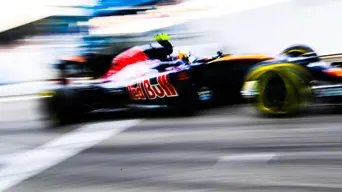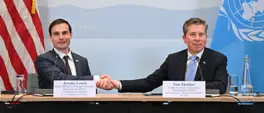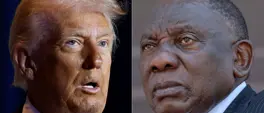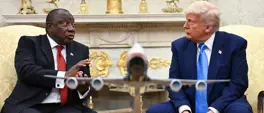Formula 1 basics: what you need to know about the pinnacle of motor racing
Tasleem Gierdien
10 September 2025 | 7:50If you want to learn more about Formula 1 racing, here are the basics, as explained by motorsport journalist Hendrik Verwoerd.

Formula 1, F1. (Archive: Toro Rosso Scuderia). Wikimedia Commons/Josemaf1photos
CapeTalk's Pippa Hudson speaks to motorsport journalist Hendrik Verwoerd.
Listen below:
Always wanted to learn more about Formula 1 racing?
Here are the basics:
The sport started with the invention of the motorcar, explains Verwoerd. Legend has it that the very first two car owners ever raced each other.
When and where did it start?
- The first-ever Grand Prix actually took place in 1906 at Le Mans, France. This early race, labelled a Grand Prix, saw drivers pit themselves personally, refuel mid-race, and manage treacherous conditions on public roads.
-
The groundwork for what became Formula 1 was laid in 1946, when the FIA (via its predecessor, the CSI) drafted the 'International Formula', later known as Formula 1. The 1946 Turin Grand Prix was the first race held under these technical regulations. The race at Valentino Park is commonly considered the inaugural F1 Grand Prix, though it was not part of a world championship.
-
F1 as a World Championship officially began in 1950, with the British Grand Prix at Silverstone on 13 May 1950 being the first of seven championship rounds that season.
Commercialisation of F1:
-
Over time, F1 evolved from purely motorsport into a global commercial enterprise, driven by media coverage, endorsements, and lucrative sponsorships. Prize money and brand partnerships turned F1 into a multi-billion-dollar broadcasting phenomenon.
-
In recent years, Liberty Media, the sport's commercial rights holder, has further boosted its appeal through initiatives like Netflix’s Drive to Survive, the signing of new global broadcast deals, and the launch of the F1 Academy to foster female talent.
How F1 racing works:
-
F1 races unfold over a weekend: practice sessions, qualifying (to determine the starting grid), then the Grand Prix itself. Points are awarded to drivers based on finishing position, with the Drivers’ Championship going to the one with the most points at season’s end.
-
Races pit cutting-edge machinery, optimised aerodynamics, and hybrid power units against driver skill, team strategy, weather, and safety systems like the Halo cockpit protection.
-
F1 cars routinely exceed 300 km/h on fast circuits. In a recent example, Max Verstappen set the fastest-ever race time at the 2025 Italian Grand Prix, averaging 250.706 km/h over the race duration.
-
F1 drivers must be extraordinarily fit, with exceptional neck strength, cardiovascular stamina, and mental acuity. Acceleration, high G-forces, heat, and precise reaction times during races demand an elite level of conditioning.
Formula 1 season:
- The 2025 Formula 1 calendar features 24 Grand Prix weekends, including six F1 Sprint races, taking place around the world from March through December.
Champions:
A name synonymous with F1 Racing is MichaelSchumacher, who is considered one of the greatest and most influential drivers in the history of Formula 1.
Schumacher is known for his unmatched dominance in the late 1990s and early 2000s and redefined success in F1 with his work ethic, technical skill, and mental resilience.
The reigning World Drivers' Champion is Max Verstappen, who has won the title four consecutive times, 2021 through 2024.
As of the 2025 Italian Grand Prix, Oscar Piastri (McLaren) leads the championship standings, followed by Lando Norris (also McLaren) and Verstappen.
Lewis Hamilton, a Brit, is one of the most iconic and successful drivers in the history of Formula 1.
Hamilton made his F1 debut in 2007 with McLaren and nearly won the championship in his rookie year. Since then, he's become a dominant force in the sport, known for both his on-track brilliance and his off-track influence.
He holds seven titles, which is tied with Michael Schumacher, and has the most wins and pole positions in F1 history.
Hamilton holds multiple all-time F1 records and has helped define the hybrid era of the sport.
Key takeaway:
If you've learnt nothing at all, Verwoerd's piece of impressive trivia to remember is that Niki Lauda won the 1984 Formula 1 World Championship by half a point over his McLaren teammate Alain Prost, the smallest margin in F1 history.
This slim victory secured Lauda's third and final world title, with half points being awarded for the shortened 1984 Monaco Grand Prix due to heavy rain.
Current talks: South Africa hosting the Formula 1 in 2027
Monaco was one of the host venues for F1's first season back in 1950 and will remain on the calendar until at least the mid-2030s.
While South Africa's Minister of Sports, Arts and Culture, Gayton McKenzie, is confident that South Africa stands a chance to host the next Formula 1 World Championships in 2027, Verwoerd doesn't think it'll happen in the near future because of the cost involved.
"Financially, it does not make sense," says Verwoerd.
F1 has also extended their contract with Monaco to race through until 2035, adds Verwoerd.
The next Formula 1 race happens on Sunday, 21 September at 1 pm, at the Baku City Circuit.
Scroll up to the audio player for more.
Get the whole picture 💡
Take a look at the topic timeline for all related articles.















